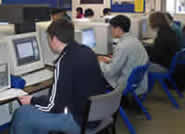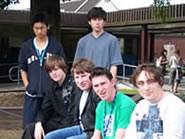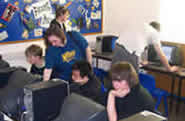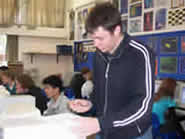
Case Study BP614: Mentoring Using Ex-students
Abstract

Reference: BP614
Title: Using ex-students as mentors
Overview: A teacher retains contact with ex-students and uses their study experience, employment knowledge, and specialist expertise, to motivate Year 12 and Year 13 students, advise them of opportunities and provide informed input into class and project work.
Focus Points: The case study highlights:
Background
Jenny Baker is Head of Department of the five-teacher ICT Department at Hillcrest High School, a decile 9 co-educational secondary school in the southeast sector of Hamilton, very close to Waikato University. The school has approximately 1,600 students.
Jenny joined Hillcrest High School in 1990 where she has been responsible for the development of the school computer network and the expansion of the ICT department.
During her time at Hillcrest, Jenny's capability and enthusiasm have been recognised at both a regional and a national level. She was a finalist in the (EiTA) National Excellence in Teaching Awards in 2002. Two years later, she received a Royal Society of New Zealand Teacher Fellowship to research technological practice in commercial and tertiary ICT. She has also been involved in external assessment for NCEA technology and in tutoring trainee teachers at the University of Waikato. ICT is a Technology choice at Year 9, and an Option subject from Year 10 to 13. Three pathways are available to students from Year 10:Hillcrest High School worked with Katikati College in the Bay of Plenty in the Hamilton/Katikati Beacon Practice partnership which focussed on teaching technology in an ICT context.
Pre-planning
Jenny Baker: "I've managed to keep in touch with students informally in the past. They enjoy coming back if invited and it's something which gives everyone benefit from both directions. I decided to try to build on this informal contact to create a scheme where these students could be actually helping the present generation of students."
Jenny has always endeavoured to keep in contact with her students after they leave school - particularly those moving on to degree courses at the University of Waikato. Email contacts proved to be a good way for successive classes of students to remain in contact.
Formal planning for the mentoring scheme started when Jenny approached the 15 Year 13 programming students leaving her 2005 class. All were keen to participate. Early in 2006 she sent out a general email to all of the students asking about what they were doing, the courses they had chosen and how they were finding things.
As Jenny says, "It all just started growing naturally from there."
Implementation

Jenny gave each email a descriptive title, edited them where required, and posted them on the school intranet where her students could easily access them. It was made clear that the postings were a general resource, and that students were not to email mentors directly.
Jenny also emailed back with a copy of her teaching timetable and an invitation to come and visit when convenient. This proved very successful.

The six Hillcrest students who won Waikato University Computer Science fees Scholarships in 2005, and who form part of Jenny's 2006 mentoring group. The Scholarships are worth $4,000 each and 10 are awarded nationally.
"Mostly they just turn up when they've got a bit of free time, bringing their laptops so they can demonstrate things to the students. This helps establish a link between what they are doing in class this year and what they could be doing next year when they leave school."
"One student this year has been helping the Year 12 students with C# ('C-sharp') - a computer language they're teaching at the University for the first time this year. He's shown the students at school the sorts of things he's doing and taught them how to do it. C# gives students the visual interface of Visual Basic which they use in Year 11. It teaches them about the code they're using in Action Script in Year 12, and gives them experience of what they're going to be doing next year in C++ in Year 13. It's turned out to be a really good intermediary between those two years." (see C# email )
The computer graphics student has been back several times during the year to show the artwork that he has been doing. He's been making current students aware of some of the broader skills required by his courses, such as photography and art and to show how at university he is now being taught these things to enhance his knowledge and skills in computer graphics. "A lot of boys, especially, get into computer graphics and just want to design computer games and don't think outside the square. Because of the narrow age gap between the mentors and the kids is they know what they are thinking and can try to get them to think a bit more widely, and the kids are more willing to listen."

Jenny takes advantage of the school's proximity to the university, by supplementing email based mentoring with visits from ex-students and willing university staff. A recent visitor from the Software Engineering Department at the University talked to the Year 12 and Year 13 programming classes about modelling.
"We've talked about modelling this year, and so far my students have used storyboards to create a model for a Flash animation. Now they're writing programmes and they're going to be once again modelling those for their NCEA assessment. The university lecturer uses finite state machines to model with. He explained that when you're doing software engineering and you're creating things like smart cards, which have no paper trail, or software for medical machinery, which is mission or 'safety' critical, you've got to model your software to make sure it's absolutely perfect before you code it. He was showing them the importance of the achievement standard criteria from a real life perspective."
Student survey:
Describe the type of contact you have had with the mentors?
Outcomes

Halfway through the year, many potential benefits for the year's class have yet to flower. One early benefit, however, came from exposing the students at the start of the year to the range of courses that ex-students were doing, enabling them to clarify their intended direction of study outside the classroom at a much earlier stage and to focus on specific options in their schoolwork.
The mentoring programme is proving particularly beneficial in reinforcing a culture of collegiality in her classroom. "ICT is growing so rapidly that no-one can be expected to know everything. You've got 25 kids in your room, and each is doing something entirely different, using different software and programming languages, and each has different problems.
Jenny Baker: "My ex-students have been so willing to respond. Some of the questions I've asked have been quite a big ask, but they usually take the time to put some detail in their answers and most are quite comfortable using the email to respond."
"As the teacher you've got to be thinking on your feet all the time about how to solve all these problems, so it's good to have the knowledge of ex-students that you can draw on. It also develops a communal sense of caring, and my students are now feeling comfortable helping one of their peers who is having problems."
A diverse bank of resources is quickly becoming established and proving very useful for providing specific information to focus student practice and to challenge students to broaden their perspective: "When students are getting a bit off-task or reluctant to focus enough attention on something, such as planning, for instance, I can now get an example from the emails. An ex-student can show current students that what they are being asked to do within an achievement standard is exactly what they are being asked to do in the real world. This is proving very helpful."
Jenny Baker: "Sometimes when someone has a problem I'll just ask the class 'can anyone work out how to do this?' And with the younger ones especially it becomes a challenge... who can be the first one to work it out. In this type of sharing they're learning so much."
As an example, a student who left school in 1995 and works as a programmer for a company in Hamilton re-established contact with Jenny on his return to Hamilton this year. She invited him to become part of the mentoring programme and he has contributed a two-page email on the general topic of 'planning' that students are now able to access when required.
"I told him that some students were having difficulty with planning, and asked him to share the sorts of planning he has to do for his work. In the email he explained to the students how he has three days of planning with all of the key stakeholders [of a project] before they can even start to look at a computer. Although it's been a bit longer since he's been at school, he still knows the way the kids think, and how they just want to get in and work at the computer. But he can show them all the advantages that come from good planning."
By emailing specific technical questions to mentors, a bank of up-to-date information is developing, which is readily available to students. This ensures that the time given by the mentors is used effectively and minimises any loss of valuable work time.
Student survey:
How is contact with mentors useful to you?
What next?
It quickly became clear to Jenny that this type of mentoring is a very easy and natural process, rewarding for both her present students and their mentors: "The computer graphics student was having his first experience of learning drawing at university. So not only is he coming back and teaching others what he's learning, but he's also able to illustrate with all these drawings that he's so proud of."
Jenny is confident that with sensible management the size and effectiveness of the project can grow naturally, and is now seeing opportunities to make much more use of it within other courses in her department.
She is extending the scheme by using this year's Year 13 students to mentor Year 12 students. "Year 13 students who used Flash and Action Script last year to create an animation for a youth issue are coming into the Year 12 class and talking about the resources they used. This relates to the work this year's students are doing on 'experts practice' which will contribute to their evidence for the external achievement standards." However, finding a time when students can be released from timetabled classes can be problematic."
Jenny has surveyed the mentors to identify other non-intrusive ways in which they would be prepared to help. She is particularly interested in finding out what the mentors did at school that they are now finding particularly useful.
"One mentor is now working in the computer gaming industry in Wellington and he talks about how valuable he's finding linear algebra, and also the experience of the programming competitions he entered as part of the computer science scholarship at Waikato."
She has also surveyed current students
to identify ways in which the scheme has been useful and whether they would be willing to participate in the scheme after leaving school themselves.
Student survey:
Would you be keen to offer to be a mentor when you leave school? Why ?
Two years later...
In September 2008, two years after publication of the original case study, Jenny remains in her position as HoD Information Technology at Hillcrest High School. She took time to comment on how the mentoring scheme has progressed since it started in 2005.
How has the scheme evolved ?
It's been going for four years now and I've got about 100 names and contact email addresses on the list now. But the basic way of operating hasn't really changed – I still send out email invitations to come in to school and talk to this year's students. Sometimes the mentors come in on their own volition and ask me if there is anyone they can help today. But basically I'm not doing anything differently.
So it just keeps ticking along successfully?
Very successfully. All I have to do is to get a note of their email addresses before they leave school and then it's just a matter of me keeping in contact and checking on how they're getting on – and they keep in touch. Last week one student was invited back to talk to a group of gifted and talented students, promoting the value of the IT programming courses he'd taken here at school. But he also came across to say 'Hello' and was able to help a couple of the senior students with specific problems they were having.
Around eight of my Year 13 students are planning on doing the computer graphics degree at Waikato University next year – so I've had three lots of ex-students come in and talk to them this year.
And every so often something new will come up and I've found it to be a very productive way to link 'outside' knowledge and practice with the work my students are doing. When I first heard about AGILE, for example, I sent out an email to several people on my list whom I knew were programming in companies, and asked about their methodology. I got back a range of detailed A4 reply sheets that I could go through and pick out the similarities and differences in the information I was looking for. It wasn't a big effort for them to do that and it wasn't a difficult task for me either.
If we explore this strategy in terms of the front end of the new curriculum, it's clearly addressing the key competencies, and specifically 'relationships with others'.
Bringing outside experts into the classroom can be a bit of a lottery at times. They are often not familiar with the school environment and can use language that students don't understand and unfortunately it all goes over their heads and end result is that they just switch off.
To get maximum value, it's important that the senior students form a relationship with the people you bring in. Students understand that this person can provide a lot of information which is relevant to them and quickly realise that the ex-students have been where they are now and so they actually listen to them much more carefully and are more willing to pick up on the advice being given.
Do you think the mentoring scheme is a good way to expose your students to the values of others?
Yes they do. I find that once the kids go to university their values change a bit. They experience the 'school world' then the 'university world' and then move into employment and have to adjust to the 'real' world outside of school and university. So bringing them back to school does expose our present students to those differing value sets.
So looking at the mentoring scheme are you going to happily keep it going?
Oh yes! Now that it's become well established it's just something that keeps itself going. The only thing I have to do is to collect the email addresses.
Curriculum links Level 6/7/8
Using this type of mentoring strategy assists the teacher in:
Establishing an environment that encourages and supports student innovation
Supporting students in accessing resources
Promoting Values education
"I find that once the students go to university their values change. They experience the 'school world' then the 'university world' and then move into employment and have to adjust to the 'real' world outside of school and university. So bringing ex-students back to school in a mentoring capacity does expose our present students to those differing value sets."